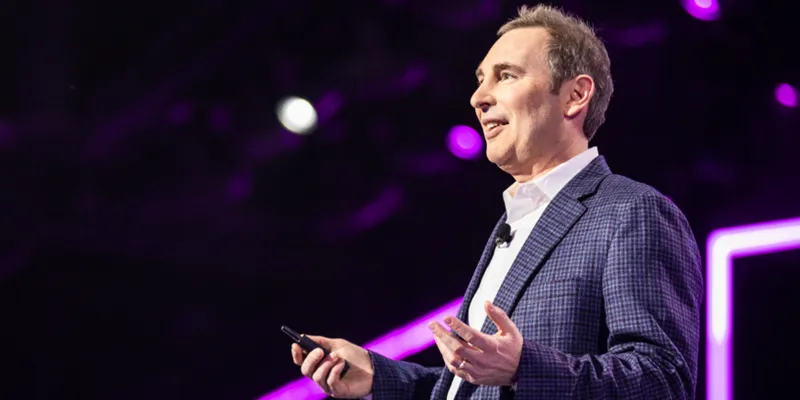AWS CEO Andy Jassy gives his take on Trump's disdain for Amazon and why cloud is the future
On the sidelines of AWS re:Invent 2019, CEO Andy Jassy speaks about how his company is facilitating digital transformation with the cloud, and more.
Andy Jassy, the CEO of AWS, has helped his company scale new heights. He founded AWS with a team of 57 people in 2003, and has since then taken it to a growth rate of 35 percent and an annual revenue run rate of $36 billion.
AWS now has millions of customers around the world using its advanced infrastructure, storage, and compute services. Some of the world’s biggest startups, including Ola, Netflix, and Airbnb, have AWS.
Amazon launched the Elastic Compute Cloud in 2006. At that time, nobody anticipated that the cloud would, one day, become the way to help enterprises scale.
On the sidelines of AWS re:Invent 2019, the massive annual Amazon Web Services cloud computing conference held in Las Vegas, Andy Jassy met select media and spoke about what was on his mind: AWS, its work with Goldman Sachs and Cerner Corporation, Trump’s anti-Amazon stance, and the future of 5G.

Edited excerpts of the interview:
YourStory: The Joint Enterprise Defense Infrastructure (JEDI) cloud computing contract went to Microsoft. What are your thoughts on that?
Andy Jassy: I cannot say much as it is under active litigation. But We are aware of the pricing and we believe that it was unfairly awarded. We are talking about the defence of the US, and we have a government that has unfairly awarded a contract.
We have a sitting president who actively comments on Twitter about a company; this is not good for democracy. It is dangerous for the country.
Our technology and functionality are ahead of the curve, but Trump openly shows disdain for Amazon. We believe that political influence prevailed in awarding contracts to our competitor. We are actively litigating that the JEDI contracts were unfairly awarded.
YS: Tell us about digital transformation with the cloud?
AJ: Look at enterprises making the transition to the cloud and those who are not. Those who have made the journey know that the cloud offers benefits of scale because of the services we offer. You have seen Goldman Sachs and Cerner Corporation embrace the cloud.
If you want to move to the cloud, I believe the first thing to do would be to align senior management. That is the biggest deterrent today. That’s why only three percent of the world is on the cloud. If you don't get senior management together, it does not happen. To get them aligned you have to create a process and have months of iteration. In the end, it is an aggressive top-down goal.
GE is a prime example. Their move to the cloud happened because the top leadership decided they had to move fast. They began doing so with 42 applications. They also worked on compliance, security, and governance for the cloud. Now they are moving a thousand apps on AWS.
An aggressive, top-down approach is important if you need to transform yourself. I met the CEO of a life sciences company, who thought they were using several AWS offerings. When I told him that they were using only two EC2 (elastic cloud) instances, he was surprised. He called his tech guy and changed that immediately.
When we meet a company, we do a deep portfolio analysis on what applications are easy to move and what are tough to move. We find that many apps can move to the cloud faster and help them transition. The only problem comes from non-tech issues like the alignment of senior leadership.
YS: Do you see cloud collaboration between different players?
AJ: I don't believe that this will happen now. This is because each one has its own functionality. But they will collaborate in the future.
YS: Why did AWS opt for ARM?
AJ: We need better processors to compute the workloads of some of our clients. We work with Intel, too. However, we also built a relationship with AMD. Pushing performance was our key.
After the acquisition of a chip development company in Israel we realised that some of our customers need powerful compute. We took 18 months to launch the next generation of ARM processors called the Graviton2. These are custom chip designs based on 64-bit ARM Neoverse cores.
The Graviton2 processors can deliver faster speed and additional memory channels with cache speed memory access that is quicker as well. The Graviton2 comes with general-purpose instances M6g and M6gd, compute-optimised instances (C6g and C6gd), and memory-optimised instances (R6g and R6gd).
YS: The Capital One affected around 100 million people in the US and about six million people in Canada. Does this impact the cloud story?
AJ: There were as many as 25 data breaches this year. You have to understand that most of them were on-premise. I don't think it has shaken the confidence of companies moving to the cloud.
When CTOs look at security, they know that the cloud is secure too.
However, security remains the number one barrier to use the cloud and that's because senior management or the industry are not aware. We need to make them aware that they get high levels of security when they work with AWS.
YS: What do you think of regulators in the age of data privacy?
AJ: We work with many of them and show them the benefits. Regulatory issues are a fact in many countries, but some countries are keen to think cloud-first.
Regulatory bodies are worried about consumers; they will keep an eagle eye on the fintech and healthcare industries when they move data to the cloud.
Again, I come back to awareness. We have a significant team that works with regulators. These regulators care about their industries and how they use data the right way. They are nervous and we are educating them with our partners. The best way is to get their confidence is to tell them that we have millions of active customers.
YS: What are your thoughts on the future with the cloud?
AJ: We are pleased about our growth rate. Our ARR is $36 billion. Our contract values are better than our competitors. The second largest cloud provider has captured only 15 percent of the market while we are close to 50 percent.
We are really focused on building value and creating a business that lasts. I believe we have the best services when it comes to new technologies such as AI. Quantum computing is the future and we have services for that.
We have Amazon Braket, a fully managed service that allows scientists, researchers, and developers to begin experimenting with computers from multiple quantum hardware providers in a single place. The Bra-ket notation is commonly used to denote quantum mechanical states, and inspired the name of the service.
The AWS Center for Quantum Computing, a research centre adjacent to the California Institute of Technology (Caltech), will bring together the world’s leading quantum computing researchers and engineers to accelerate the development of quantum computing hardware and software. It will take several years before it has real impact, but we strongly believe in its promise.
AWS’ business is growing faster than anyone can imagine – 35 percent year on year. It is so early in this titanic shift and the cloud is going to be big business. We have so many customers who want to use the AWS platform. It changes possibilities for business in the long run.
Our customers are excited; they cannot believe the power our chips and new capabilities in AI give them. Smart cities and smart cars are the future, and the cloud is going to be a big part of that.
(Edited by Teja Lele Desai)




